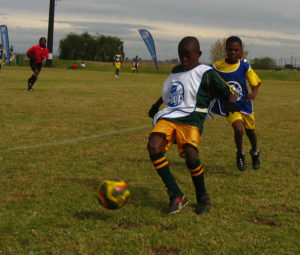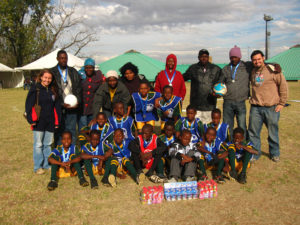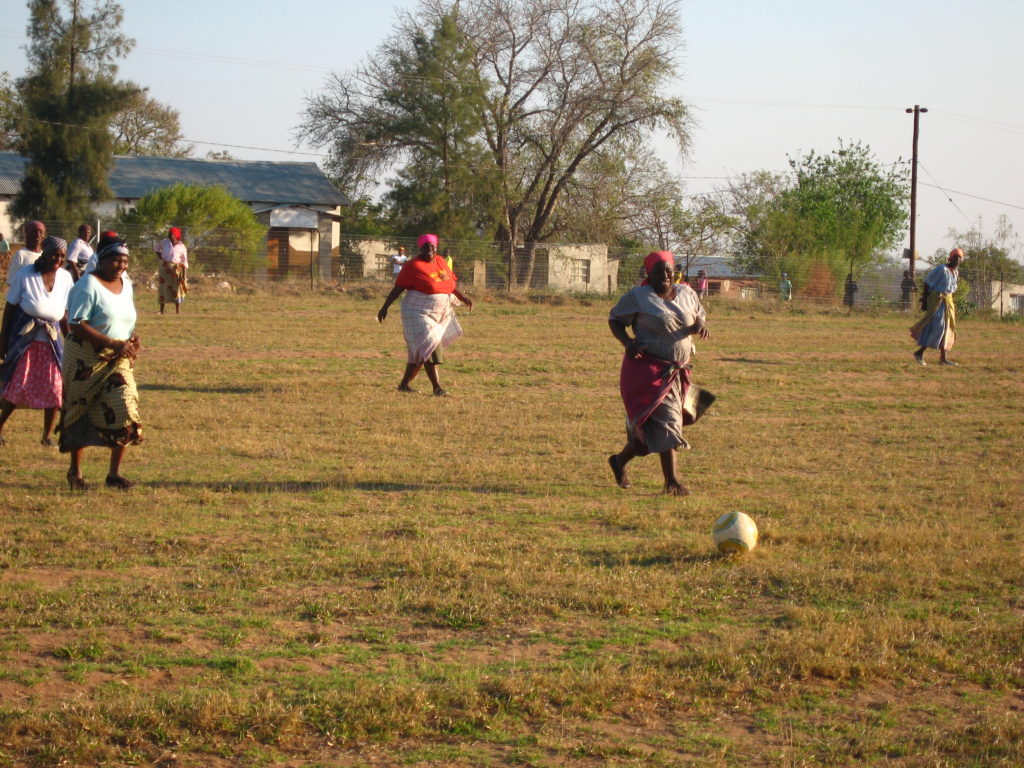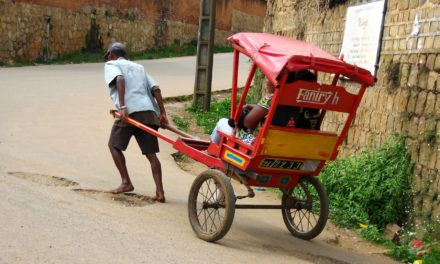Early last winter, we accompanied one of our primary schools to a far-off township as their “Under 12” boys’ soccer team competed for the title of provincial soccer champions. It was an exciting time for us, to take an all-day trip with some of our school’s students and almost all the staff to a place we’d never been before and see what the larger sports competitions were like.
We hadn’t even realized that our small rural school’s soccer team was performing so well that they could compete at the provincial level, that they had first beat all the other schools in the circuit, then everyone in the region, and were only a few more games away from representing our province in the competition for the entire national championship.
 So, we found some seats (or made some), endured the cold (yes, South Africa can get cold in the winter, not every day, but some days), and watched our school’s team beat the other regions’ teams one after the other. It was impressive; many of the games were won without the other teams even scoring a single point against ours. And this wasn’t regular little kids’ soccer games; African kids are GOOD at soccer. When they have a ball, or anything like a ball, they’ll play all day every day. Still, our team seemed to be smoking the competition.
So, we found some seats (or made some), endured the cold (yes, South Africa can get cold in the winter, not every day, but some days), and watched our school’s team beat the other regions’ teams one after the other. It was impressive; many of the games were won without the other teams even scoring a single point against ours. And this wasn’t regular little kids’ soccer games; African kids are GOOD at soccer. When they have a ball, or anything like a ball, they’ll play all day every day. Still, our team seemed to be smoking the competition.
So, I expressed my surprise at the quality of our boys’ soccer team to their coach, one of the teachers with whom I’d been developing a good friendship. He started pointing out which of their players were the best, saying they were “new players”. I asked their names and grades and said that I didn’t remember seeing them in our Grade 6 or Grade 7 classes at our school. He said, “no, they’re from Mawewe.” Mawewe is the name of the high school for both our village and the neighboring village; it starts from Grade 8. Many kids in our Grade 7 class are 15 or 16, some even 18, so I didn’t see any way that some of the kids from Mawewe could be “under 12”.
Their coach smiled and told me simply, “we have a saying here: ‘the best cheater wins’”. That caught me off guard. I mean, by then we’d seen some people cutting corners, we knew of some large-scale government corruption and things like that, but we never expected anyone to flat-out tell us that they approved of cheating. That statement was so much the opposite of our American phrase: “cheaters never prosper.”
Their coach went on to explain (on that occasion and in subsequent conversations) that without any regard to age, they pick from among the best players they want to be on their soccer team that are also still small and young-looking enough. Because the teams have to present birth certificates and photo IDs to the competition, the kids that are over 12 simply borrow birth certificates from younger kids, attach their own photos, and also memorize their “new” name and birth-date, in case they’re questioned by the tournament officials.
It works out easily enough because birth certificates don’t automatically include photos (for obvious reasons) and the younger kids’ parents don’t mind loaning them to the older kids on the team because they also know the same maxim: “the best cheater wins.” Besides, even some of the legitimately under 12 soccer players don’t have birth certificates because they or their parents are refugees from nearby Mozambique. Borrowing birth certificates is “necessary” in any case, so they figure they might as well also use it to the advantage of their team.
This coach and several other teachers and sports lovers told me that in Africa, everyone has two ages: their real age and their “soccer age” (the soccer age being significantly lower). Soccer is such a widely-loved sport in Africa and there are plenty of teams and tournaments for specific age ranges, that cheating on a person’s age to give a younger team an advantage is supposedly as equally widespread as the sport itself.
They even told me that the national “under 20” team for another African country north of us was recently in a big scandal. A new system for identifying the approximate age (give or take a few years) was developed that somehow measures an aspect of the bones in the forearm. Because it’s approximate, anything registering up to 25 years old still has to be accepted. Even still, nearly half of the 20 or so players from this national team were disqualified by this testing method. This means that many of their tests registered above 25, for a team that was supposed to be composed of all “under 20s”. How many of the remaining players are still cheating and still fit the narrow margin of test acceptability?
It was an interesting concept for me. The coach told me that “the best cheater wins” just a few games before our school’s team played the finals and I figured I’d pay attention and see if I could recognize any cheating myself. One regional team was disqualified along the way, because their soccer players forgot what the names on their birth certificates were supposed to be.
 And sure enough, the other team in the final play-offs against our school’s team was composed of quite a few boys that looked quite a LOT older than 12. No facial hair yet, but almost. Or just well-shaved. Our coaches and teachers started complaining that the other team was “obviously” cheating and should be disqualified. But nothing could be done because they had younger birth certificates and had memorized their names and birthdates well enough to pass the test.
And sure enough, the other team in the final play-offs against our school’s team was composed of quite a few boys that looked quite a LOT older than 12. No facial hair yet, but almost. Or just well-shaved. Our coaches and teachers started complaining that the other team was “obviously” cheating and should be disqualified. But nothing could be done because they had younger birth certificates and had memorized their names and birthdates well enough to pass the test.
The end of that story: our team lost. They weren’t the best cheaters in the province that year, only the second-best. Truly the team that won were the best cheaters. Those kids were definitely way too old and everyone agreed. But our teachers and staff begrudgingly admitted that the winners deserved the win; they had outsmarted everyone and had managed to get the oldest possible kids on their “under 12” team.
So far, we’ve only heard that saying, “the best cheater wins,” applied to sports. But I have a feeling that it extends to a lot more of everyday life than just that. Certainly we notice its effects all the time. When people are involved in a transaction and have the chance to set the price for something, they usually add 10 or 20% to the original, nothing specific, but enough that they can take some real benefit from it. Everyone seems to know and expect that too.
If kids are in line to receive some sort of handout (like fruit or candy or pencils or anything a kid would want) they fight for the front of the line and then after they have their turn, they almost always try to quickly sneak in again at the back of the line, hoping the adult won’t notice. When they’re caught they sometimes first try to argue a bit and convince you they’ve received nothing or that some tragedy has befallen their first portion. But in the end, when they see it’s really not going to work, they just smile and shrug their shoulders. Sometimes a teacher or other adult will also smile and point out that the kid is “clever”, whether they catch him/her in the act or even if they don’t realize it until sometime later.
Most of the time that someone thinks we (or any foreigner, but especially white people) don’t know the correct price of something, they’ll jack it up a bit, maybe adding as much as 50 or 100% of the original price, or try to charge us extra for something like luggage (though they don’t charge for anyone else) and they try to pass that one by on us. Then if we demonstrate that we know the actual expected price and refuse to pay anything above it, they often laugh or smirk and sometimes even say, “well, I had to try!”
Really, I’ve seen taxi drivers try the same sort of trick on out-of-towners who are from the same ethnic group as themselves and speak the same home language. The trick may be less likely to work, but they still make an effort.
The smiles and the overall friendliness involved when someone tries to dupe you is nice enough, but it can still be very frustrating. Especially when you see those things as symptomatic of the whole culture. Especially when you see that your schools aren’t getting their allocated funding or improvements to infrastructure or new learning resources because some guy at the top “got away with” millions of the government’s rands.
A lot of externally funded and managed development agencies and their foreign workers simply refuse to work in that type of system at all, either completely closing up shop or only attempting efforts that don’t involve any money or responsibilities passing through local hands. This often continues to hurt local economies that are already hurt by frequent corruption, while perpetuating the same kind of unequal relationships that characterized the colonial era.
Other development groups and workers seem to simply ignore the likelihood of corruption entirely, not attempting to find any method of avoiding any of it and not notifying any of their donors that it’s a likely obstacle to achieving their stated developmental goals. They’re basically willing to blindly face the high chance that all their efforts will be wasted, which are the only real reason for trying to raise money in the first place. Maybe they’re worried their funding and/or their job will be cut out if the likelihood of corruption affecting their projects is known about. And maybe they’re right.
For us, being confronted with these issues has been difficult for other reasons. Thankfully we don’t really have any money and almost none of the work we do involves us in financial transactions or “valuable” resources at all, certainly not in a local scale that would attract much shady dealing. But when we find out that people we’ve come to know and trust and respect are sometimes involved in these types of dealings and that they do sometimes delay or hinder our own projects to help our schools, well, that’s just difficult. Sometimes it makes you wonder who you can trust at all.
But then again, this is where we are. Peace Corps placed us here. Unlike other development agencies, we don’t have much choice about where we work and who we work with. So even with the knowledge that someone we formerly trusted and respected was involved in something we’d consider improper, we’re still around that person often, sometimes every day, talking to them, trying to work with them, etc. And we get to know them even better. And we regain trust and respect for them. That person may even be the best and most responsible worker we know here. And they’re still involved in those sorts of dealings that we consider “improper.” But so is everyone else, usually.
When we take a poll of everyone we know and trust here, and we ask them about certain types of transactions that seem shady to us, we find out that no one really considers most of them improper at all. They’re normal and quite expected. And this is from people we know and trust, from all of the people we know and trust here.
If you think about it harder, a lot of the “shadiness” of these transactions results in them being informal and non-universally applied, changing from person to person and from time to time. Otherwise they’re essentially the same thing we know of as “service fees” and “interest rates” in our own country and that are usually part of most transactions there. All of our trusted friends here do agree that the same basic practice of taking extra for oneself, but expanded on the much larger provincial and national scale (where they already have service fees, etc.) is deplorable and is keeping the country down.
However, it still leaves the question: why is it that “the best cheater wins” here in South Africa and “cheaters never prosper” in America? I think it has a lot to do with our respective histories.
In America, we’ve been lucky enough to establish our own government, “by the people, for the people.” It’s our own society, our own banking systems, our own work ethics, created by us and for us, to help us to live long and prosper. To maintain it, to make it successful, pretty much everyone needs to work within the system and its guidelines. A “cheater” is violating that and threatening the stability of the system for everyone. But, because we know the system, if we’re determined enough, we can work within it and usually get ahead just fine.
In Africa, the history is quite different. They did have their own systems, ones that worked quite well for them. They were much more informal though and of a much smaller scale. Most of them were systems where “one good turn deserves another”; basically everyone was supposed to help each other out when they could and where they could and they also received help in return and it all worked mostly fine.
But then France and Holland and Portugal and England and other colonial powers showed up and set up their own system. The African system and the African guidelines were completely disregarded and overlooked as if they’d never existed at all. Quite the contrary, the new systems were being set up to exploit material resources as quickly as possible, and for the benefit not of the country they were located in, but instead for the benefit of people and places much further removed.
Other than some scattered early missions efforts (which really focused almost entirely on Western enculturation, not necessarily a good thing), you can’t really say there was anything in the whole setup that was good at all for Africans. Repeat this story around most of the world and you can quickly account for several hundred years of world history during the age of colonialism.
So what kind of response do you think Africans really had available to them? If a person doesn’t know or understand a system, or if the system is designed to abuse and not benefit him/her, what can they do but try to work outside the system, find some loophole or local knowledge that helps and doesn’t hurt them? And that’s called “cheating.”
In that case – a situation where the entire system is constructed and maintained without your input, either personally or culturally, a system that takes advantage of you and your land and all your resources – at that point, really only “the best cheater wins.” A lot of Africans had to cheat the system to survive. Many still do.
And all this thinking about cheating and shady dealing reminds me of the parable that Jesus told at the beginning of Luke chapter 16. It’s a parable that always just seemed strange and didn’t really seem to fit with everything else in our belief systems.
In this story, there’s a dishonest manager (essentially a personal financer) gets caught by his master and will soon be fired. So, he goes and lowers the debts of most of his master’s biggest debtors, lowering them by huge sums as big as annual salaries for wealthy business-people. His idea is that if he does this for them, then later on when he’s out of a job and threatened with living on the streets, they’ll put him up in their homes for a while and then he can move on to the next “friend” he made from cancelling lots of their debt.
It’s a shady deal that he quickly performed when he knew he was going to lose his job for being a dishonest manager in the first place, but it’s also a decent solution for a soon-to-be-unemployed man with nothing saved up for a rainy day. Certainly the story seems more familiar to me now that I’ve lived in South Africa for a couple of years.
But the finale of the story is the big surprise: the master who was firing this dishonest manager (and presumably still will) actually commends him for acting so shrewdly! Translate that as “wise”, “clever”, whatever you want, but he tricked his master one last time, losing LOTS of his masters’ profits, and gained some security for himself. And for that, his master apparently had to admit that he did well, begrudgingly or not. And this is a story being told by Jesus.
In our system where “cheaters never prosper,” this story is bizarre in the least, especially when we consider it comes from a book of moral and religious instruction. But in South Africa where “the best cheater wins,” it actually makes perfect sense. He “had to try”, and he was “clever” and succeeded, and therefore worthy of commendation (even if not worthy of continuing to manage anyone’s personal finances).
I think it also makes a bit more sense if you consider that Israel at that time was being colonized by Rome mostly the same way many African countries were colonized in their past. Jesus himself, always one to cause a stir, wasn’t just standing against the Roman system though. He even stood against the Jewish system of his day, a situation that had become so perverted and heavily institutionalized that it subjected most of its constituents to all sorts of abuses simply in the interest of the social and financial gain of the elite few.
The history of that time actually sounds a LOT like Africa and all other sorts of colonial and abusive systems, situations where “cheating the system” is the only way to get ahead or even survive. And it sounds like Jesus himself may be commending that sort of solution.
It may be a little different though too. Part of verse 8, right after the master commended his dishonest manager for acting shrewdly, says that “the children of this age are more shrewd in dealing with their own generation than are the children of the light.” Some other statements by Jesus and another parable (about Lazarus and the Rich Man) seem to follow it up with less “dishonest” dealings and for less selfish motivations. But I think the point is still basically the same: some situations require a person to deal wisely, within or even outside the established systems of the time, using resources to benefit people but not to be pursued as an end in itself or for selfish gain.
The Word Biblical Commentary makes a good point about this passage, saying: “the law of the Old Testament and the gospel of the New Testament speak with a united voice about the need for a practical moral response to be lived out in the human interactions of life.”
I think the point isn’t that we should engage in corruption or dishonest dealings for personal gain. But we do need to be shrewd, we need to be clever. We need to recognize the systems we’re working in, both where they promote abundant life (the very thing Jesus came to offer) and where they hinder it. And we need to recognize and understand the people we’re living among and dealing with, whether they’re “dishonest” or not. Neither ignoring the systems and the corruption they breed nor refusing to work with them is the right answer.
I think the right answer is to know who and what we’re dealing with so that we can find creative solutions both within available systems and outside oppressive ones. Our solutions need to take into account any accepted cultural practices of deal-making and find ways to minimize loss and waste along the way. And all along, the solutions need to be geared towards offering Jesus’ abundant life to everyone. Either withdrawing from or ignoring obstacles cannot offer that.
So the “children of the light” need to be just as shrewd or even more so than the “children of this age.” But rather than for selfish motivations, it’s to help establish the kingdom of God and abundant life for everyone.





